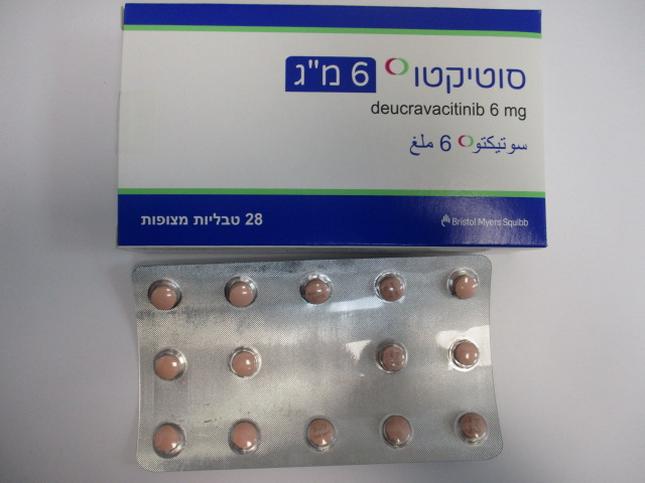Quest for the right Drug

סוטיקטו 6 מ"ג SOTYKTU 6 MG (DEUCRAVACITINIB)
תרופה במרשם
תרופה בסל
נרקוטיקה
ציטוטוקסיקה
צורת מתן:
פומי : PER OS
צורת מינון:
טבליות מצופות פילם : FILM COATED TABLETS
עלון לרופא
מינוניםPosology התוויות
Indications תופעות לוואי
Adverse reactions התוויות נגד
Contraindications אינטראקציות
Interactions מינון יתר
Overdose הריון/הנקה
Pregnancy & Lactation אוכלוסיות מיוחדות
Special populations תכונות פרמקולוגיות
Pharmacological properties מידע רוקחי
Pharmaceutical particulars אזהרת שימוש
Special Warning עלון לרופא
Physicians Leaflet
Special Warning : אזהרת שימוש
4.4 Special warnings and precautions for use Infections Deucravacitinib may increase the risk of infections (see section 4.8). Treatment with deucravacitinib should not be initiated in patients with any clinically important active infection until the infection resolves or is adequately treated (see section 4.3). Caution should be exercised when considering the use of deucravacitinib in patients with a chronic infection or a history of recurrent infection. Patients treated with deucravacitinib should be instructed to seek medical advice if signs or symptoms suggestive of an infection occur. If a patient develops a clinically important infection or is not responding to standard therapy, the patient should be monitored carefully and deucravacitinib should not be given until the infection resolves. Pre-treatment evaluation for tuberculosis Prior to initiating treatment with deucravacitinib, patients should be evaluated for tuberculosis (TB) infection. Deucravacitinib should not be given to patients with active TB (see section 4.3). Treatment of latent TB should be initiated prior to administering deucravacitinib. Anti-TB therapy should be considered prior to initiation of deucravacitinib in patients with a past history of latent or active TB in whom an adequate course of treatment cannot be confirmed. Patients receiving deucravacitinib should be monitored for signs and symptoms of active TB. Malignancies Malignancies, including lymphomas and non-melanoma skin cancer (NMSC), were observed in clinical studies with deucravacitinib. It is not known whether tyrosine kinase 2 (TYK2) inhibition may be associated with the adverse reactions of Janus Kinase (JAK) inhibition. In a large randomised active controlled study of a JAK inhibitor in rheumatoid arthritis (RA) patients 50 years and older with at least one additional cardiovascular risk factor, a higher rate of malignancies, particularly lung cancer, lymphoma and NMSC, was observed with a JAK inhibitor compared to tumour necrosis factor (TNF) inhibitors. Limited clinical data are available to assess the potential relationship of exposure to deucravacitinib and the development of malignancies. Long-term safety evaluations are ongoing. The risks and benefits of deucravacitinib treatment should be considered prior to initiating patients. Major adverse cardiovascular events (MACE), deep venous thrombosis (DVT) and pulmonary embolism (PE) It is not known whether TYK2 inhibition may be associated with the adverse reactions of JAK inhibition. In a large randomised active-controlled study of a JAK inhibitor in RA patients 50 years and older with at least one additional cardiovascular risk factor, a higher rate of MACE, defined as cardiovascular death, non-fatal myocardial infarction and non-fatal stroke, and a dose dependent higher rate of venous thromboembolism including DVT and PE were observed with a JAK inhibitor compared to TNF inhibitors. An increased risk of MACE, DVT and PE was not observed in clinical trials with deucravacitinib. Long-term safety evaluations for deucravacitinib are ongoing. The risks and benefits of deucravacitinib treatment should be considered prior to initiating patients. Immunisations Prior to initiating therapy with deucravacitinib, consider completion of all age-appropriate immunisations according to current immunisation guidelines. Use of live vaccines in patients being treated with deucravacitinib should be avoided. The response to live or non-live vaccines has not been evaluated. Excipients Lactose This medicinal product contains lactose. Patients with rare hereditary problems of galactose intolerance, total lactase deficiency or glucose-galactose malabsorption should not take this medicinal product. Sodium This medicinal product contains less than 1 mmol sodium (23 mg) per tablet, that is to say essentially ‘sodium-free’.
Effects on Driving
4.7 Effects on ability to drive and use machines Deucravacitinib has no or negligible influence on the ability to drive and use machines.

שימוש לפי פנקס קופ''ח כללית 1994
לא צוין
תאריך הכללה מקורי בסל
לא צוין
הגבלות
לא צוין
רישום
175 38 37671 99
מחיר
0 ₪
מידע נוסף
